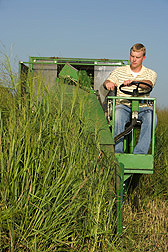Crop-based biofuels burn cleaner than gasoline—but there’s a hitch. Listen up for the water-guzzling scoop:

When you think biofuel, do you think water? (via Peggy Greb / USDA)
Everything you’ve heard is true: Compared with fossil fuels, burning biofuels releases fewer greenhouse gases. But what you might not know is that producing the cleaner-burning fuel also requires a lot of water.
Take corn-based ethanol, for example, which is what we’ve historically seen at the pump. Grasses generally need less water to grow since you can plant a varied and more resilient crop.
But Carey King of the University of Texas at Austin says the mixed materials are more challenging to refine, so they have their own drawbacks.
Research is now focusing on making biofuel from algae that can grow in wastewater, but she says protecting the environment still means using less fuel of any kind.
“Biofuels, like many technologies, are no panacea,” he adds.
One way to avoid the whole dilemma, at least sometimes: Break out your comfy shoes and hoof it whenever possible.
Get Schooled:
- Fuel your knowledge about the water needs of fuels in this Energy Policy paper by Carey King and colleagues
- Check out this Environmental Science and Technology paper on the “Water Intensity of Transportation” by Carey King and Michael Webber
- Understand the tradeoffs of biofuel crops in this factsheet by The International Water Management Institute
- Drink up the details about the threats of corn ethanol in this factsheet from the Union of Concerned Scientists
The fine print:
- This segment was produced in partnership with Cornell’s Atkinson Center for a Sustainable Future




